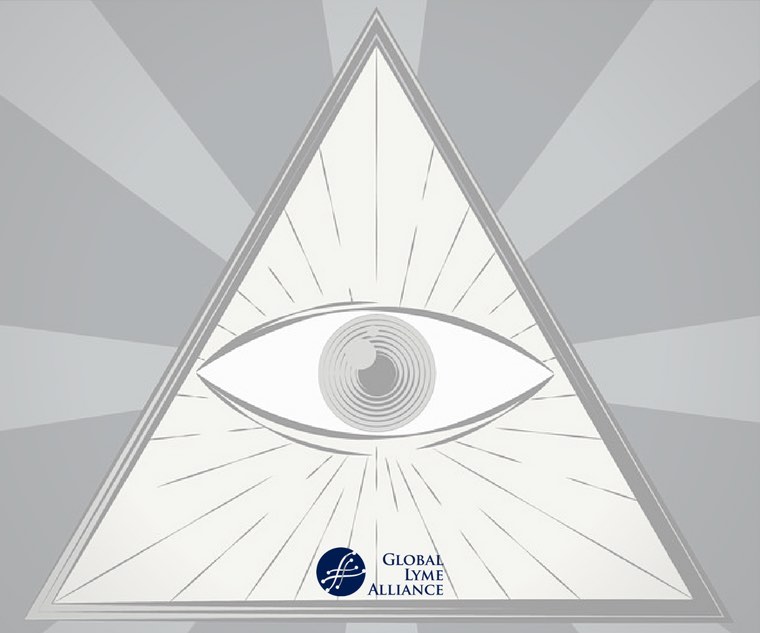
The role of your Illymenati membership
Recently a friend sent me a photo of a classic bullseye rash she’d found on her daughter’s leg. “Does this look like a tick bite to you?” “100%,” I replied. I told her about the difficulties in diagnosing Lyme, the importance of testing for co-infections , which co-infections were most prevalent in her area, and the dangers of taking a “wait and see” attitude. I sent her information from the Global Lyme Alliance website, told her the difference between the International Lyme and Associated Diseases Society (ILADS) and the Infectious Diseases Society of America (IDSA), and gave her Centers for Disease Control and Prevention (CDC) and ILADS guidelines for treatment that she could share with her pediatrician. I’m no doctor. However, my personal medical experience, my interactions with various ILADS doctors, my attendance at Lyme conferences, and my extensive personal research have made me something of an expert on tick-borne illnesses. I have become a member of the Illymenati. Like the Illuminati—meaning “the enlightened” and referring to those in a special club—the Illymenati are those who have been enlightened by Lyme. A fellow patient’s boyfriend coined the phrase as a tribute to those who have fought for diagnosis, treatment and awareness, and have had to learn patience, courage, self-compassion and resilience. Sound familiar? Patients who have been accurately diagnosed with tick-borne illness by a Lyme literate physician (LLMD) often face uphill battles to get to that point. For me, it took eight years from tick bite to diagnosis, a journey filled with mysterious symptoms, physical and emotional ups and downs, multiple misdiagnoses and fever pitch frustration. When positive tests and a clinical evaluation by an LLMD proved that I had Lyme, Ehrlichia, and Babesia, I wanted to shout from the rooftops, “Hey world! Guess what? I have Lyme disease!” If only I’d known what that really meant. At the time of diagnosis, I was in the dark about the complications and consequences of untreated tick- borne illness. Over the next several years, I learned about spirochete patterns, Herxheimer reactions, biofilms, EM rashes, co-infection symptoms and treatments, and adjunct therapies such as neurofeedback and integrative manual therapy. I learned to take probiotics two hours before or after my antibiotics. I learned why antibiotics sometimes need to be pulsed. I learned the ins and outs of Lyme testing, and came to understand why so many doctors had missed the mark on my diagnosis. Perhaps most importantly, I learned that the disease was not my fault. For so long I had been ashamed of being sick. I tried to hide it, to appear “normal.” It took many trials of patience and years of talk therapy for me to accept my illnesses and put blame for them on the tick, not on myself. It took time to undo the message I’d been given by so many people, that being sick was “all in my head.” Eventually I stopped denying my illnesses, realizing that I’d do better to accept and treat them. I became much more gentle to myself and my body responded in kind. In French, the word survivor— survivre—means to rise above. “ Sur” means “above” and “ vivre” is “to live”. The Illymenati are true survivors. We live through this disease, we live with it, and we rise above it. We are warriors. And as members of this special club, we have an obligation to enlighten others. It is up to us—as well as doctors, researchers, and advocates—to spread Lyme awareness. I never expected to be a subject area expert on Lyme disease, but that’s where life has led me. I can’t talk cogently about physics, I don’t know much about geology, and I don’t speak Japanese. But I am fluent in Lyme and its tick-borne co-infections, and the more people I can get to speak this language, the better. Opinions expressed by contributors are their own.
Jennifer Crystal is a writer and educator in Boston. She is working on a memoir about her journey with chronic tick-borne illness. Contact her at
jennifercrystalwriter@gmail.com
Opinions expressed by contributors are their own.
Jennifer Crystal is a writer and educator in Boston. She is working on a memoir about her journey with chronic tick-borne illness. Contact her at
jennifercrystalwriter@gmail.com

GLA
Admin at GLA




-2.jpg)

